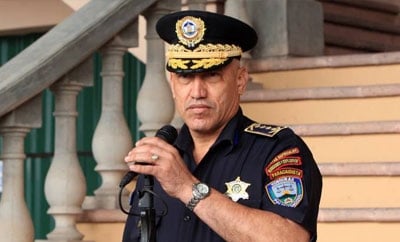The decision to remove almost 100 officers from the Honduran police force has created a backlash that could see an uprising against the country’s police chief and seriously hinder efforts to clean up one of the most corrupt forces in the region.
Juan Carlos Bonilla, Honduras’ chief of police, declared on October 24 that elements within the force are conspiring to disrupt the decision this week to remove 99 officers from the police, including two former police chiefs, Ricardo Ramirez del Cid and Jose Luis Muñoz Licona, reported the Associated Press.
“I have information that there are some who are meeting … and planning to take action. We are ready for them,” Bonilla stated. According to the AP, a top official has confirmed this, saying that a group of 30 police has been meeting to devise a plan to remove Bonilla. They will first try the judicial route, calling on President Porfirio Lobo to fire the police chief. If that fails, the AP’s source says officials are considering a possible takeover of police headquarters.
InSight Crime Analysis
This is worrying news and adds to the force’s reputation as being one of, if not the worst in the region in terms of corruption and ineptness. One congressman estimated last year that up to 40 percent of Honduran police may have ties to organized crime and if efforts to clean up the force continue to meet obstacles such as the one Bonilla mentions, it does not bode well for the future of Honduras’ police.
Sadly, there is a precedent for this kind of politicking, with the country’s former Security Minister Oscar Alvarez — an outspoken critic of police corruption — being forced to resign last year. His move was seen as a victory for corrupt police agents.
There is reason, however, to question Bonilla’s sincerity when he says he is intent on cleaning up the police. The AP had access to internal documents showing that three people on Bonilla’s list, including Ramirez, had signed a 2004 document arguing against his promotion, recommending that he receive psychotherapy for “anxiety” issues. He may therefore be exacting revenge in seeking their removal. Additionally, a number of people on the list have been successfully vetted, passing toxicology exams, background checks and lie detector tests.
Bonilla is far from clean himself. The police chief is accused of being part of a death squad a decade ago and was charged with extrajudicial murder in 2002. He was found innocent two years later, but suspicion over his dark past continues.
Police reform is urgently needed in Honduras. It appears, however, that it would be better handled by an independent body, in order to avoid politicizing the process and sparking the kind of turmoil that may be brewing inside the force.

